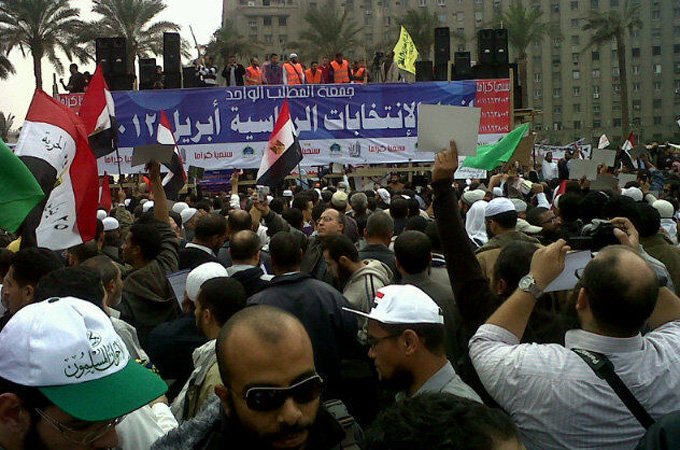Egyptians gather for rally in Tahrir Square
![]()
Middle East
Rally called by both Islamist and secular groups aimed at pressing military rulers to hand power to civilian government

The rally in Tahrir Square was called over a controversial document floated by the government [Malika Bilal/Al Jazeera]
Thousands of Islamist and secular protesters have gathered in Cairo’s Tahrir Square for a mass rally to press the ruling military to hand power to a civilian government.
As legislative elections draw near, the first polls since a popular uprising toppled Hosni Mubarak’s presidency, protesters are demanding more control over the constitution the new parliament is to draft.
Friday’s demonstration was called over a document floated by the government which declares the military the guardian of “constitutional legitimacy”, suggesting the armed forces could have the final word on major policies.
The Muslim Brotherhood says the document reinforces “dictatorship” and has promised an escalation if it is not shelved.
While Friday’s protest will draw different political stripes under different banners, the unifying call is for the military to hand power to a civilian government as soon as possible.
The powerful Muslim Brotherhood and its Freedom and Justice Party led the call for the protest.
Liberal, leftist and other Islamist parties, as well as pro-democracy movements that launched the January 25 uprising, said they would participate in the rally.
Several secular groups were set to march from the Mohandesseen neighbourhood to Tahrir Square under the banner “We want a president”, calling on the ruling Supreme Council of the Armed Forces (SCAF) to hand power to a civilian president by April 2012 at the latest.
Al Jazeera’s Sherine Tadros, reporting from Cairo said the two main demands of the protesters were to prevent the imposition of the government’s document, and to set a date for the presidential elections.
“People are saying there has been no referendum on this document, and are asking why it is being imposed before the upcoming elections,” she said. “They see this as the military trying to impose their rule.”
“They are telling the military to stop trying to unilaterally control this transition period,” she said.
According to Tadros, several tents are currently being installed in Tahrir Square: “There are calls by certain parties for a sit-in until the document is withdrawn by the government,” she said. “Tents are being set up, but it is unclear if this is going to be a big movement. There is however, a big momentum behind the protest.”
She reported that a “million man march” was also called for in Alexandria, Egypt’s second largest city.
The protest was due to officially start after the noon Muslim prayers, but the early-morning crowds pointed to a large turnout.
Contested document
The contested government document, presented by Ali Silmi, the deputy prime minister in the interim government, includes clauses that remove the military’s budget from parliamentary oversight and allowed the SCAF a final say on military-related matters.
The government revised the draft but Islamists, who organised a mass protest in July against such a charter, have rejected the very idea of a document that would limit parliament’s authority to draft the constitution, branding the articles as undemocratic.
The Muslim Brotherhood, through its Freedom and Justice Party, may emerge as the largest bloc in the election.
The SCAF, which took charge after Mubarak’s removal and suspended the constitution and parliament, says it will hand over power once a new president is elected.
Parliamentary elections will start on November 28 and are expected to end in March.
The Tahrir Square demonstration comes a day after 25 people were injured when a Coptic Christian march came under attack by assailants throwing stones and bottles.
The Copts were marching on Thursday to demand justice for the victims of a clash with soliders in October that left at least 25 people dead, most of them Christian.
A security official told the AFP news agency that supporters of an Islamist election candidate in the northern neighbourhood of Shoubra joined in the attack on the Copts.
Copts, who make up roughly 10 per cent of Egypt’s 80 million people, complain of discrimination in Egypt.
Related Articles
La exclusión de la otra Colombia
![]()
El show de Santos Una noticia reveladora El presidente colombiano Juan Manuel Santos prohibió el martes 23 de julio que
Colombia. Sobre los cuatro soldados de La Marina acusados de rebelión
![]()
Investigación: Así opera el cartel de testigos para fabricar falsos positivos La consolidación militar, adelantada dentro del marco contrainsurgente
Los paros agrarios y la lectura de su impacto político
![]()
Contribución para un debate necesario Colombia ha sido conmovida en los meses recientes por grandes movilizaciones campesinas y populares. Desde


